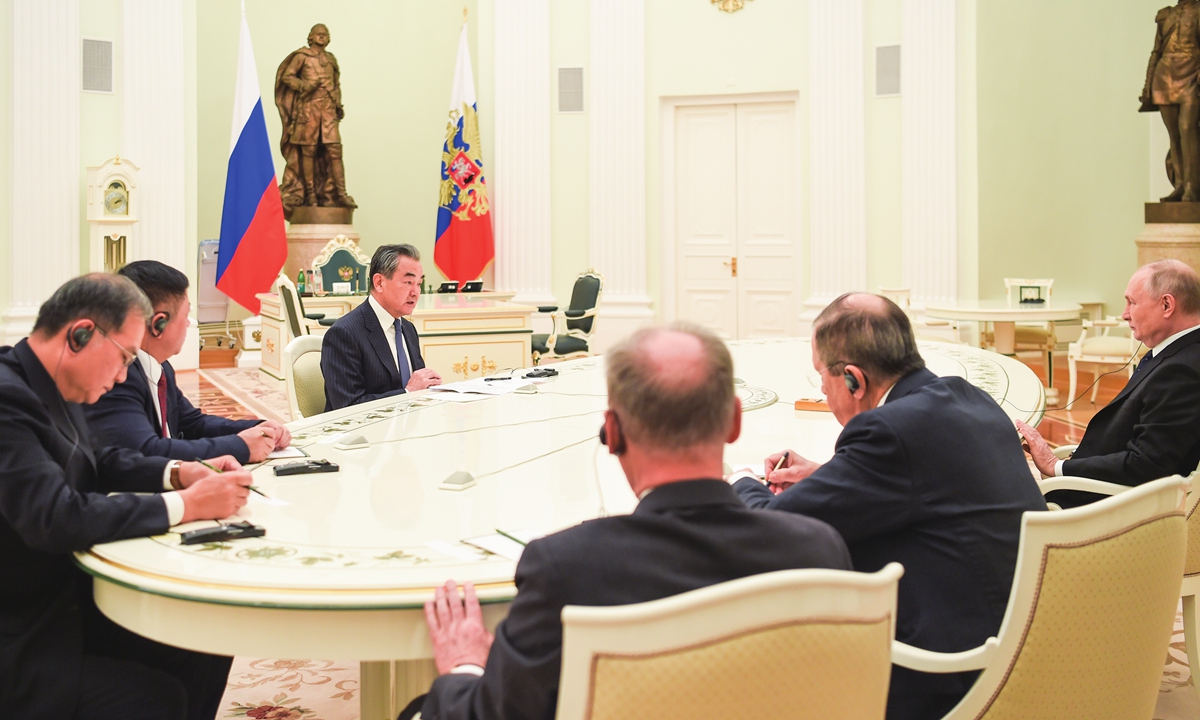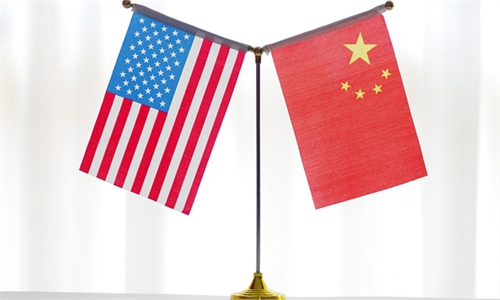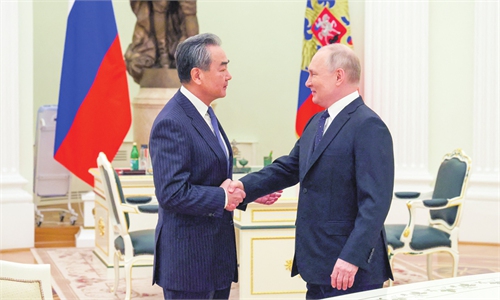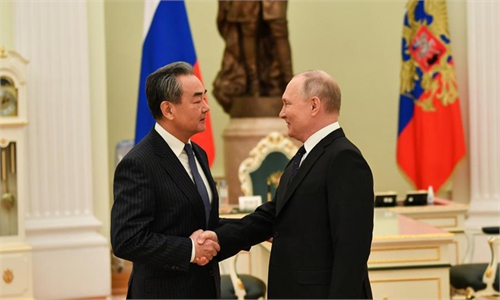
Wang Yi (third from left) attends a meeting with Russian President Vladimir Putin (first from right) at the Kremlin in Moscow on February 22, 2023. Photo: Xinhua
Wang Yi, a member of the Political Bureau of the Communist Party of China Central Committee and director of the Office of the Central Commission for Foreign Affairs, recently paid a visit to Europe with an aim to reboot the China-Europe relations. During this eight-day visit, Wang met with almost all the key European leaders, US Secretary of State Antony Blinken, addressed the 59th Munich Security Conference in Germany and then finally talked with Russian President Putin. Wang delivered a highly effective keynote speech at the MSC that was laced with overtures of peace, cooperation and mutual trust for mutual benefit. "China follows a new vision of common, comprehensive, cooperative and sustainable security, as put forward by President Xi Jinping," said Wang in his speech. Wang's remarks are a reflection of the thinking of the Chinese leadership toward global peace, stability through multi-polarization.The impact of the COVID-19 pandemic has played a significant role in disrupting the communication and exchange between China and Europe. This has obviously given birth to a plethora of misapprehensions and misjudgments of China in Europe and seriously hampered the China-Europe cooperation. Despite the fact that there are no fundamental incongruities between China and Europe on key matters, things gradually turned sour, particularly as the Russia-Ukraine conflict provided enough fuel for Washington to dissuade its European allies from engaging with China. While maintaining their stands on the respective core interests, there is broad consensus, common interests, and a common stance between China and Europe. The urge to enhance cooperation, interactions and engagements with China is still the dominant trait in Europe, as reflected by the massively positive response Wang received during his visit to Europe.
However, there has been a major shift in the Europeans' previous relatively independent foreign policy - devoid of the American influence in general - toward China. The eruption of COVID-19 pandemic and the outbreak of the Russia-Ukraine conflict disrupted diplomatic engagement between China and Europe. This provided an excellent opportunity to Washington to dictate its European allies on its China threat narrative. The indirect collateral damage of the tense relations between China and the US is the widening chasm in the China-Europe relationship. Wang's visit has at least resurrected the ties between the two sides and provided a starting point to reboot the lost impetus. Throughout this tour, despite some extremely provocative and discouraging comments by certain hawkish elements in the West, Wang very effectively extinguished all such propaganda by consistently sticking to China's principled stand of peaceful coexistence.
France recently retracted the entry restrictions for Chinese travelers, while a similar decision is expected from the EU to drop the requirement of negative pre-departure COVID tests for visitors from China. These decisions are not just symbolic in nature, but they highlight two important developments. First, the European capitals are now grasping the rationale behind Beijing's COVID policy and they are accommodating the Chinese perspective on the matter. And secondly, it also reflects a desire in Europe to engage positively with China by encouraging the frequent people-to-people interactions that will boost tourism, mutual trade and investments. So, ice is breaking after Wang's trip.
Wang used this opportunity to comprehensively explain Beijing's position on the balloon episode, which is being deliberately exploited by the US to malign China as some sort of "surveillance-obsessed" country, as well as to effectively defend the Chinese stance on the Russia-Ukraine conflict. China has been proposing a negotiated peace deal to extinguish the Russia-Ukraine conflict that has so far catapulted the global economy into the worst kind of inflation storm. The country issued China's Position on the Political Settlement of the Ukraine Crisis on Friday.
Not surprisingly, Washington, after its miserable failure to malign China through the balloon episode, is now blatantly using a new concocted allegation of weapons supply to Russia. There is desperation in the Biden administration to fuel the anti-China propaganda through this new allegation pertaining to weapons supplies to Moscow. Against this backdrop, Wang's visit to Moscow and meeting with Putin has caused much irritation in Washington, which is now unnecessarily portraying China's indirect involvement in the Ukraine conflict. But China's Friday statement is a slap in their faces.
There is every reason to believe that the US is now deliberately trying to tag China with the Russia-Ukraine conflict so as to find a scapegoat for its failure in Ukraine. The Americans know very well that its military and financial support will never enable Kiev to win this war of attrition and eventually the grand finale will be a negotiated deal. That's why, they have already started docketing China in the Ukraine affair so as to find a "reasonable excuse" later on for their failure. Wang, being a professional diplomat, very effectively utilized the last two days of his trip in Moscow to dispel this emerging narrative from Washington. Nonetheless, through Wang's trip, Beijing has sent a clear message of its serious intent for closer cooperation with Europe and Russia for a better and peaceful world - certainly a well-timed stroke by Beijing.
The author is freelance columnist on international affairs. opinion@globaltimes.com.cn



